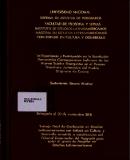| dc.contributor.advisor | Meoño Soto, Rodolfo. | |
| dc.contributor.author | Winther, Snorre | |
| dc.date.accessioned | 2020-08-04T23:37:37Z | |
| dc.date.available | 2020-08-04T23:37:37Z | |
| dc.date.issued | 2010 | |
| dc.identifier.other | 000285473 | |
| dc.identifier.uri | http://hdl.handle.net/11056/17825 | |
| dc.description | Maestría en Estudios Latinoamericanos | es_ES |
| dc.description.abstract | El propósito del presente proyecto es rescatar la experiencia de un pueblo indígena en particular dentro del actual proceso de introducción de autonomías. Durante la práctica se ha investigado a fondo la implementación de la nueva política oficial cuyo fundamento esta principalmente basado en las exigencias populares expresadas en la “Agenda de Octubre” tras la revolución en el 2003. Bolivia constituye un punto estratégico para el control de América Latina y por eso ha sufrido innumerables ataques imperialistas que, debido a sus pertenecientes elementos de explotación laboral, sobre todo han afectado a las poblaciones indígenas. Paralelo a los masivos programas de privatización de los recursos básicos al principio del siglo XXI surgió una nueva etapa decisiva en la lucha de los movimientos sociales, principalmente representados por indígenas, que culminaría en un cambio político radical a partir del 2006. Este año se promulgo una nueva Constitución, ajustada y reelegida en 2009, que sobre todo está caracterizada por un mayor grado de representación y participación de todos los sectores del pueblo boliviano. En el 2010, por primera vez en la historia de la república, Bolivia entra en una fase decisiva de una reterritorialización. El presidente indígena actual, Evo Morales, promueve esta iniciativa, expresada en la Ley Marco de Autonomías y Descentralización, por un lado bajo el propósito de refundar los territorios indígenas, de acuerdo con documentos ancestrales y la estructuración territorial de los ayllus y por otro de introducir más influencia política para los indígenas en general.
En el presente trabajo final de graduación se ha investigado las nuevas posibilidades tanto como las estrategias para obtener una influencia política real del pueblo indígena de Coroma a los niveles regional y nacional. La investigación fue realizada a través de la colaboración con el Proyecto Coroma, las filmaciones ejecutadas para el documental, la observación personal de reuniones locales y del conflicto potosino. Dentro del proceso transitorio actual el mayor desafío ha sido la delimitación interdepartamental y ha causado un aumento en las disputas regionales ya existentes. El éxito de las luchas de los movimientos sociales durante el siglo XXI se debe a una nueva estrategia de crear amplias alianzas y fue precisamente a través de este mismo método que las autoridades originarias de Coroma lograron unir a todo el departamento potosino a una huelga general que ha sido conocido como la más grande de la historia potosina. | es_ES |
| dc.description.abstract | The purpose of this project is to rescue the experience of a particular indigenous people within the current process of introducing autonomy. During the practice, the implementation of the new official policy has been thoroughly investigated, whose foundation is mainly based on the popular demands expressed in the "October Agenda" after the revolution in 2003. Bolivia constitutes a strategic point for the control of Latin America and for this reason it has suffered innumerable imperialist attacks that, due to their belonging to elements of labor exploitation, above all have affected the indigenous populations. Parallel to the massive programs of privatization of basic resources at the beginning of the 21st century, a new decisive stage emerged in the struggle of social movements, mainly represented by indigenous people, which would culminate in a radical political change starting in 2006. This year, a new Constitution was promulgated, adjusted and re-elected in 2009, which, above all, is characterized by a greater degree of representation and participation of all sectors of the Bolivian people. In 2010, for the first time in the history of the republic, Bolivia enters a decisive phase of reterritorialization. The current indigenous president, Evo Morales, is promoting this initiative, expressed in the Framework Law on Autonomy and Decentralization, on the one hand with the aim of re-founding the indigenous territories, in accordance with ancestral documents and the territorial structure of the ayllus, and on the other hand to introduce more political influence for the indigenous people in general.
This final graduation paper has investigated new possibilities as well as strategies for obtaining real political influence from the indigenous people of Coroma at the regional and national levels. The research was carried out through collaboration with the Coroma Project, filming for the documentary, personal observation of local meetings and the Potosi conflict. Within the current transitional process, the greatest challenge has been interdepartmental delimitation and has caused an increase in existing regional disputes. The success of the social movements' struggles during the 21st century is due to a new strategy of creating broad alliances and it was precisely through this same method that the original authorities of Coroma managed to unite the entire Potosi department in a general strike that has been known as the largest in Potosi's history. | es_ES |
| dc.description.sponsorship | Universidad Nacional, Costa Rica | es_ES |
| dc.language.iso | spa | es_ES |
| dc.publisher | Universidad Nacional, Costa Rica | es_ES |
| dc.rights | Acceso abierto | es_ES |
| dc.rights | Attribution-NonCommercial-NoDerivatives 4.0 Internacional | * |
| dc.rights.uri | http://creativecommons.org/licenses/by-nc-nd/4.0/ | * |
| dc.subject | REVOLUCIÓN | es_ES |
| dc.subject | POLÍTICA | es_ES |
| dc.subject | BOLIVIA | es_ES |
| dc.subject | DEMOCRACIA | es_ES |
| dc.subject | REVOLUTION | es_ES |
| dc.subject | POLITICS | es_ES |
| dc.subject | DEMOCRACY | es_ES |
| dc.title | La experiencia y participación en la revolución democrática contemporánea boliviana de los nuevos sujetos emergentes en el proceso transitorio autonómico del pueblo originario de Coroma | es_ES |
| dc.type | http://purl.org/coar/resource_type/c_bdcc | es_ES |
| una.tesis.numero | 324.208414 W789e | es_ES |
| dc.description.procedence | Instituto de Estudios Latinoamericanos | es_ES |


